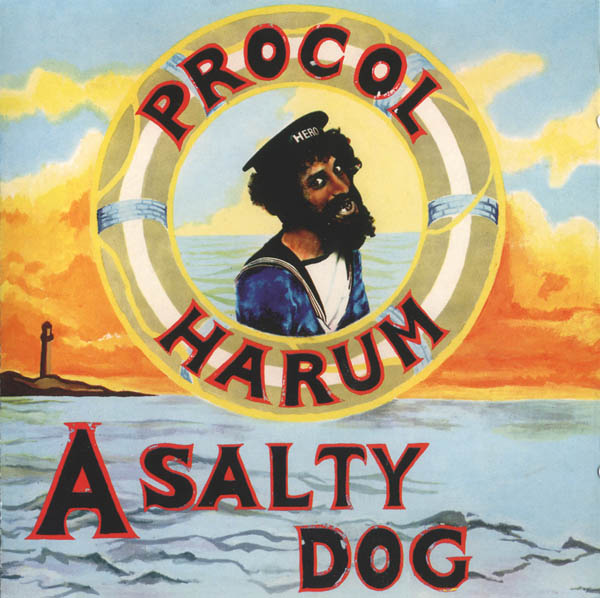 A
call for 'all hands on deck' opens Procol Harum's third album, and with the
command, an effort that witnesses the band coming into its own as a collective
capable of fusing classical structures with rock motifs via an expertise,
virtuosity, and style matched by none of its peers is on its way to making
history. A Salty Dog survives as proof no other artist ever sounded like
Procol Harum – while also demonstrating few collectives boasted a lineup full of
such ace instrumentalists. Stacked with exploratory themes, boundary-crossing
directions, and sweeping melodies, A Salty Dog proudly veers off
traditional course and ventures to intrepid places forbidden to even the most
thrill-seeking groups of the highly experimental era. The intertwined symmetry
between organist Matthew Fisher and pianist Gary Brooker, central to every song
[sic] on the set, gets revealed with newfound detail, openness, and clarity.
Produced by Fisher, A Salty Dog now resonates with a presence and
immediacy stunted on prior editions. The full-bodied tones, front-to-back
imaging, and grand dynamics inherent on this audiophile edition elevate the 1969
favorite to landmark status. In addition, the evocative cover art, which pays
homage to the Player's Navy Cut logo, is reproduced in faithful-to-the-original
fashion.
A
call for 'all hands on deck' opens Procol Harum's third album, and with the
command, an effort that witnesses the band coming into its own as a collective
capable of fusing classical structures with rock motifs via an expertise,
virtuosity, and style matched by none of its peers is on its way to making
history. A Salty Dog survives as proof no other artist ever sounded like
Procol Harum – while also demonstrating few collectives boasted a lineup full of
such ace instrumentalists. Stacked with exploratory themes, boundary-crossing
directions, and sweeping melodies, A Salty Dog proudly veers off
traditional course and ventures to intrepid places forbidden to even the most
thrill-seeking groups of the highly experimental era. The intertwined symmetry
between organist Matthew Fisher and pianist Gary Brooker, central to every song
[sic] on the set, gets revealed with newfound detail, openness, and clarity.
Produced by Fisher, A Salty Dog now resonates with a presence and
immediacy stunted on prior editions. The full-bodied tones, front-to-back
imaging, and grand dynamics inherent on this audiophile edition elevate the 1969
favorite to landmark status. In addition, the evocative cover art, which pays
homage to the Player's Navy Cut logo, is reproduced in faithful-to-the-original
fashion.The cinematic breadth of the sonics parallels the scope of the bold arrangements, which include strings, recorders, bells, celeste, and a myriad of guitars. Brooker and Fisher split vocal duties, save for on Crucifiction Lane, which boasts a rare lead from marvel-in-the-making Robin Trower. The latter's prodigious guitar lines add another distinctive element to the compositions and further up the ante of the interplay between Brooker and Fisher. Trower accents tracks such as the topsy-turvy The Milk of Human Kindness with bluesy vibes and jolts Juicy John Pink by way of jukejoint energy. Not to be outdone, BJ Wilson's still-unsung percussion draws from R&B and swing techniques to supply a natural albeit firm footing.
For all the proficient playing and narrative storytelling, the most impressive feat surrounding A Salty Dog remains its accessible complexity and relative modesty. Procol Harum never comes across as pretentious, self-indulgent, or contrived. Anchored by Fisher's unique Hammond M102 organ riffs, the works function as a summation of their parts. Tunes like Wreck of the Hesperus serve as wondrously varied tapestries stitched with swelling chamber rhythms, barbed thickets of distortion, and thundering progressions. It's a ravishing picture of majestic subtlety and sheer power.